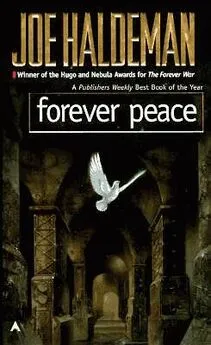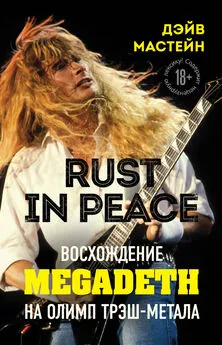Joe Haldeman - Forever Peace
- Название:Forever Peace
- Автор:
- Жанр:
- Издательство:неизвестно
- Год:неизвестен
- ISBN:нет данных
- Рейтинг:
- Избранное:Добавить в избранное
-
Отзывы:
-
Ваша оценка:
Joe Haldeman - Forever Peace краткое содержание
Copyright © Joe Haldeman 1997
Version 1.0
1998 Hugo Award Winner
1999 Nebula Award Winner
This novel is for two editors: John W. Campbell, who rejected a story because he thought it was absurd to write about American women who fight and die in combat, and Ben Bova, who didn't.
Caveat lector: This book is not a continuation of my 1975 novel The Forever War. From the author's point of view it is a kind of sequel, though, examining some of that novel's problems from an angle that didn't exist twenty years ago.
Forever Peace - читать онлайн бесплатно полную версию (весь текст целиком)
Интервал:
Закладка:
Once on the ground and out of the chopper, the twenty-nine soldierboys could easily destroy the city themselves, without air support. Part of our show was going to be a "public service" demonstration: a block of tenements to be razed. We could save the city a lot of construction, or deconstruction, expense. Just walk in and pull things down.
We set down gently on the town square, flyboys hovering, and disembarked into a parade formation, ten by three, minus one. Only a scattering of people were there to watch us, which surprised no one. A few curious children and defiant teenagers and old people who live in the park. Only a few police; most of the force, it turned out, was waiting down by our demonstration area.
The buildings surrounding the square were late colonial architecture, graceful in the shadow of the glass-and-metal geometries that hovered over them. The blind reflective windows of those modern buildings could conceal a city full of watchers, maybe snipers. As we marched off in robotic lockstep I was more than ever aware of the fact that I was a safe puppeteer a couple of hundred miles away-if rifles did appear in each window and started firing, no actual people would be killed. Until we retaliated.
We broke step into a carefully random rolling gait as we crossed an old bridge, so as not to be embarrassed by shaking it apart and falling into the noisome trickle below, and then went back to the slam-slam-slam that was supposed to be so intimidating. I did see a dog run away. If any humans were being terrorized along our route, they were doing it indoors.
Past the postmodern anonymity of downtown, we went through a few blocks of a residential neighborhood, presumably upper-class dwellings, all hidden behind tall whitewashed walls. Watchdogs howled at our echoing steps, and in several places we were tracked by surveillance cameras.
Then we got into the barrios. I always felt a kind of referred sympathy for the people who lived in these circumstances, here and in Texas, so similar to the American black ghettos that I had avoided by accident of birth. I also knew that there were sometimes compensations, family and neighborhood bonds that I never experienced. But I could never be sentimental enough to consider that a reasonable trade-off for my longer life expectancy; higher life expectations.
I turned down my olfactory receptors a notch. Smell of standing sewage and urine starting to steam in the morning sun. There was also the good smell of corn baking, and good strong peppers, and somewhere a chicken roasting slowly, maybe a celebration. A chicken was not an everyday menu item here.
You could hear the crowd several blocks before we got to the demonstration site. We were met by two dozen mounted police-mounted on horses-who formed a protective V, or U, around us.
It made you wonder who was demonstrating what. Nobody pretended that the party in power represented the actual will of the people. It was a police state, and there was no question whose side we were on. I suppose it didn't hurt to reinforce that every now and then.
There must have been two thousand people milling around the demolition site. It was obvious we were moving into a pretty complicated political situation. There were signs and banners proclaiming actual people LIVE HERE and ROBOT PUPPETS OF RICH LANDOWNERS, and so forth-more signs in English than in Spanish, for the cameras. But there were a lot of Anglos in the crowd, too, retirees showing support for the locals. Anglos who were locals.
I asked Barboo and David to halt their platoons in place for a minute, and sent a query up to Command. "We're being used here, and it looks like a potentially bad situation."
"That's why you were issued all the extra riot gear," she said. "This crowd's been gathering since yesterday."
"But this isn't our job," I said. "It's like using a sledgehammer to swat a fly."
"There are reasons," she said, "and you have orders. Just be careful."
I relayed that to the others. "Be careful?" David said. "Of us hurting them or of them hurting us?"
"Just try not to step on anybody," Barboo said.
"I'd go further," I said. "Don't injure or kill anybody to save the machines."
Barboo agreed. "That's a corner the rebels may try to back us into. Stay in control of the situation."
Command was listening. "Don't be too conservative. This is a show of force."
It started out well. A young Ender who'd been standing on a box, haranguing, suddenly jumped off and ran over to stand in the way of our progress. One of the mounted police touched him on the bare back with a cattle prod, which knocked him down and threw him into a trembling seizure at David's feet. David stopped dead and the soldierboy behind him, distracted by something, ran into him with a crash. It would have been perfect if David had fallen over and crushed the helpless fanatic, but at least we were spared that. Some of the crowd laughed and jeered, not a bad response under the circumstances, and they spirited the unconscious man away.
That might protect him for a day, but I'm sure the police knew his name, address, and blood type.
"Straighten up the ranks and files," Barboo said. "Let's keep moving and get this over with."
The block we were supposed to demolish was identified with a girdle of orange spray paint. Hard to miss, anyhow, since a solid square of police and sawhorses kept the crowd a neat hundred meters away on all four sides.
We didn't want to use explosives more powerful than the two-inch grenades; with the rockets, for instance, individual fragments of brick could go a lot farther than a hundred meters, with the force of a bullet. But I queried for a calculation and got permission to use the grenades to weaken the buildings' foundations.
They were six-story concrete slab constructions with crumbling brick facades. Less than fifty years old, but the work had been done with inferior concrete-too much sand in the mixture-and one building had already collapsed, killing dozens.
So it didn't sound like a big deal to bring them down. Grenades to jar things loose at the foundation, then put a soldierboy at each corner to push and pull, putting torsion on the framework structure, and jump back as it falls-or don't jump back; demonstrate our invulnerability by standing there unaffected by the rain of concrete and steel.
The first one went perfectly-a textbook demonstration, if there were a textbook on bizarre demolition techniques. The crowd was very quiet.
The second building was recalcitrant; the front facade fell away, but the steel frame wouldn't twist enough to snap. So we used lasers to cut through a few exposed I-beams, and then it came down with a satisfying crash.
The next building was a disaster. It came down as easily as the first, but it rained children.
More than two hundred children had been squeezed into one room on the sixth floor, bound and gagged and drugged. It turned out that they were from a suburban private school. A guerrilla team had come in at eight in the morning, killed all the teachers, kidnapped all the children, and moved them into the condemned building in crates covered with UN markings, just an hour before we had gotten there.
None of the children survived falling sixty feet and being buried by rubble, of course. It was not the sort of political demonstration a rational mind might have conceived, since it demonstrated their brutality rather than ours-but it did speak directly to the mob, which collectively was no more rational.
When we saw all the children, of course we stopped everything and called for a massive medevac. We started clearing away rubble, numbly looking for survivors, and a local brigada de urgencia crew came in to help us.
Barboo and I organized our platoons into search parties, covering two thirds of the building's "footprint," and David's platoon should have done the other third, but the shock had them badly disorganized. Most of them had never seen anyone killed. The sight of all those children mangled, pulverized-concrete dust turning blood into mud and transforming the small bodies into anonymous white lumps-it unhinged them. Two of the soldierboys stood frozen, paralyzed because their mechanics had fainted. Most of the others were wandering aimlessly, ignoring David's orders, which were barely coherent, anyhow.
I was moving slowly, myself, stunned by the enormity of it. Dead soldiers on a battlefield are bad enough – one dead soldier is bad enough-but this was almost beyond belief. And the carnage had just started.
A big helicopter sounds aggressive no matter what its actual function is. When the medevac chopper came beating in, someone in the crowd started shooting at it. Just lead bullets that bounced off, we ascertained later, but the chopper's defenses automatically acquired the target, a man shooting from behind a billboard, and fried him.
It was a little too impressive, a large spalling laser that made him explode like a dropped ripe fruit. The cry "Murderers! Murderers!" began, and in less than a minute the crowd broke through the police lines and attacked us.
Barboo and I had our people move quickly around the perimeter, spraying tanglefoot, curling threads of neon that quickly expanded to finger thickness, then to ropes. It was effective at first, sticky as Superglue. It immobilized the front couple of ranks of people, bringing them to their knees or flattening them. But that didn't stop the ones behind them, who eagerly crowded over their comrades' backs to get to us.
In seconds the mistake was apparent, as hundreds of them, immobilized, were crushed under the weight of the screaming mob that charged us. We popped VA and CS gas everywhere, but it barely slowed them down. More fell and were trampled.
A Molotov cocktail exploded on one of Barboo's platoon, turning him into a flaming symbol of staggering helplessness-in reality, he was just blinded for a moment-and then weapons came out all over, machine guns chattering, two lasers lancing through the dust and smoke. I watched a row of men and women fall in unison, swept down by a misaimed spray of their own machine gun fire, and relayed the order from Command, "Shoot anyone with a weapon!"
The lasers were easy to spot, and went down first, but people would pick them up again and keep firing. The first man I ever killed, a boy actually, had scooped up the laser and was firing offhand, standing up. I aimed for his knees, but then somebody knocked him down from behind. The bullet struck the center of his chest and blew his heart out his back. On top of everything else, that pushed me over the edge, into paralysis.
Park went over the edge, too; the other edge, berserk. A man got to him with a knife, and tried to climb up and poke out his eyes, as if that were possible. Park grabbed an ankle and swung the man like a doll, spattering his brains on a concrete slab, and tossed his twitching body into the mob. Then he waded into the crowd like an insane mechanical monster, kicking and punching people to death. That snapped me out of my shock. When he wouldn't respond to shouted orders, I asked Command to deactivate him. He killed more than a dozen before they complied, and his suddenly inert soldierboy went down under a pile of enraged people, pounding it with rocks.
It was a truly Dantean scene, bloody crushed bodies everywhere, thousands of people staggering or crouching, blinded, gagging and spewing as the gas swirled around them. Part of me, vertiginous with horror, wanted to leave the place by fainting, let the crowd have this machine. But my crew was in bad shape, too; I couldn't desert them.
The tanglefoot suddenly dissipated in a cloud of colored smoke, but it didn't make any difference. Everyone who had been immobilized by it was lying dead or crippled.
Читать дальшеИнтервал:
Закладка:









